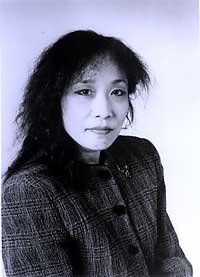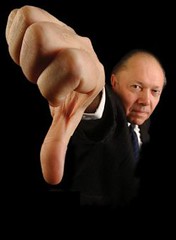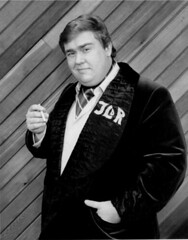 Want to test a writer's honesty? Ask him to name his favorite literary critic.
Want to test a writer's honesty? Ask him to name his favorite literary critic.
If he answers, “My favorite literary literary critic is the one who likes my books the most,” then you know you've got a straight shooter.
Oh, one could argue that a book review is not simply about the author or even the book, that it should probe deeper meanings that lie beyond the confines of a book’s covers, but when it’s your book, something that you’ve poured years of blood and tears and toil into, not to mention lots of dollars donated to mental health professionals, all you really care about can be boiled down to a single query: “Is Michiko Kakutani gonna like it?”
In the rarified world of book criticism, Kakutani, a reviewer for the New York Times, occupies the firmament. She has gotten a lot of grief over the years, most lately in a full-throated takedown earlier this week in Slate, but is one of the few book critics recognizable to the casual reader. She is also most certainly the only book reviewer ever mentioned on "Sex and the City."
Not a theorist hailing from the academy nor an essayist in the tradition of Alfred Kazin or James Wood, Kakutani is the master of the one-off review. Her aim is usually straightforward: saying if a book is worthy or if it stinks, leaving the philosophizing to others.
Kakutani is known both for her love letters and heartless eviscerations. As recently as Friday, she began a review with the following gentle, balanced, thoughtful lead: “A.M. Homes’ dreadful new novel, ‘This Book Will Save Your Life,’ reads like a cartoon illustration for a seminar on men and middle age.”
“Damn, that’s harsh,” you say, but it’s typical. Kakutani likes you, you’re the shit; if not, you are shit. (Then it’s time to research if you want to commit suicide like a) Hemingway or b) Sylvia Plath.)
The knocks on Kakutani are worth examining. There’s never a middle ground in her verdicts, even when trying to stake such a claim: she’ll say that a book is both “derivative” and “affecting,” for instance, but only one of those adjectives is going to stick. Her reviews are chided as an excuse to trot out the thesaurus, and naysayers complain that she writes like a mechanical, graceless hack, not unlike the authors she slams. Kakutani has been ruthlessly lampooned for limning her reviews with lugubrious repetition, particularly for using the words “lugubrious” and “limn.”
Here’s where things get interesting. The most accomplished of writers can go apeshit when you mention Kakutani, and the Slate article quotes no less than Salman Rushdie, Norman Mailer, and Susan Sontag bashing Michiko.
It strikes me as positively weird the amount of breath writers spend in talking about one particular reviewer. Granted, Kakutani is one of the most powerful book critics in America; she’s not the only writer of “Books of the Times,” but she’s undoubtedly the most widely regarded, Pulitzer and all, and nobody is writing essays dissing Janet Maslin or William Grimes. And I’m sure Kakutani can make or destroy careers.
But the authors who complain that she’s too harsh, or inconsistent, or crazy sound sometimes like the nut jobs protesting the Muhammad cartoons — if you’re a first novelist, you might be worried where your career goes if Kakutani slams your book, but do you really need an order of protection from Michiko when you’re Susan Sontag or Normal Mailer?
Then there’s the matter of history. Something tells me that we’re not going to be turning to Kakutani for a verdict on English literature of the past 25 years, the same amount of time she’s been reviewing books (non-fiction as well). That’s not necessarily because she lacks the intellectual chops to write broad critical essays, but she chooses not to.
Which makes the attacks on her all the more interesting, because if it’s a legacy you’re worried about, Kakutani is not going to have much of a say in determining it. Unlike most of her contemporaries, don’t expect a book compilation of her pieces that will influence legions of writers and critics to follow.
Because the world of literary, highbrow fiction is relatively small, someone in Kakutani’s position becomes a larger-than-life specter, someone who receives serious navel gazing on the part of the literary community. I’d bet every dollar spent on “The Bridges of Madison County” and “Bridget Jones’ Diary” that most of the public doesn’t give a damn about Kakutani’s opinion, or writers’ opinions about Kakutani.
I can’t say I hate her work, clunky writing and all. Admittedly, I like a good slam. (My brief with Kakutani is that she seems to enjoy building ‘em up and knocking ‘em down, like a kingmaker or a drug-abuse counselor: she’ll love the first novel, despise the second, and we’ll see about the third if there is one.)
Everyone's a critic
I admire Kakutani for being an equal-opportunity basher. Rushdie, John Updike, and Margaret Atwood alike have been targets of her poison pen. She doesn’t play favorites or try to curry favor from (or friendships with) the literary establishment. Another thing I admire about her is that she’s consistent, in terms of aims and style. She is what she is, damn the people who can't stand her.
This leads to my free-of-charge suggestion, Michiko, if I may call you that, if you’re within sniffing distance of this blog. Here’s a way to put your estimable talents to good use while not having to suffer the slings and arrows of outraged writers.
Do the reverse of your colleague (and former film critic) Janet Maslin: ditch the book game and become a film critic.
This makes so much sense that it probably appears ludicrous to Michiko or her admirers, but bear me out. Kakutani often labels books “performances,” and her thumbs-up-or-down approach is perfectly suited for the movie-review business, in which readers mostly want to know if a flick is good before plunking down $10 to see it.
In addition, she excels at breaking a book into its components such as plot, characterization, and style, just like a good movie critic breaks a film into the script, acting and directing. And being a collaborative art, film offers many more targets to criticize or praise, which is what she does best. She won't have to focus on the defenseless, lonely writer who ends up looking like the victim of a vituperative attack.
And no single movie critic — not Roger Ebert, not Anthony Lane, not even the late Pauline Kael — ever wields that much power, thus insulating yourself from the harsh criticism that you’re impossible to please. The fact (I’m guessing) that not one major critic found “Porky’s” a cinematic masterpiece on the level of “Throne of Blood” or “The Rules of the Game” did not relegate “Porky’s” to failure. Horny teenagers weren’t about to let that to happen.
Listen, Michiko, this is a total winner. Movie reviews are perfect for you. Sure, you’ll no longer be the Big Dog — there are far too many moviegoers and film critics for you to wield the type of power you’ve got now. But when you call something “dreadful,” even a sub par Spielberg or Altman effort, it might sound reasonable, because we all know how many terrible movies are out there, and even Hitchcock made a few stinkers. You won't sound bitchy, and when you like a film, you'll prose will sound positively rapturous compared to some of the jokers writing movie reviews out there.
Like I said, this advice is offered free of charge, Michiko. I doubt you’re going to take it, but remember the spirit in which it was offered.
And if I am ever fortunate enough that my novel receives your scrutiny and you decide that it’s “dreadful,” remember that my suicide will be on your conscience.
Sunday, April 16, 2006
Unsolicited Career Advice to Michiko Kakutani
Subscribe to:
Comment Feed (RSS)


|